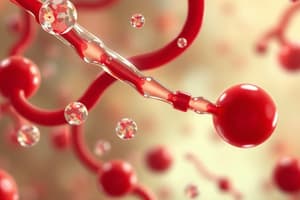Podcast
Questions and Answers
What is the therapeutic class of heparin?
What is the therapeutic class of heparin?
- Antihypertensive
- Anticoagulant (correct)
- Analgesic
- Antibiotic
What is the pharmacologic class of heparin?
What is the pharmacologic class of heparin?
- Antithrombotics (correct)
- Antihistamines
- Anticonvulsants
- Antidepressants
What is the expected pharmacological action of heparin?
What is the expected pharmacological action of heparin?
Potentiates the inhibitory effect of antithrombin on factor Xa and thrombin. In low dosages, prevents the conversion of prothrombin to thrombin by its effects on factor Xa. Higher doses neutralize thrombin, preventing conversion of fibrinogen to fibrin.
What are the therapeutic uses of heparin?
What are the therapeutic uses of heparin?
What are some side/adverse effects of heparin?
What are some side/adverse effects of heparin?
What are contraindications for using heparin?
What are contraindications for using heparin?
What should be considered with caution when administering heparin?
What should be considered with caution when administering heparin?
What are some interactions to be aware of when using heparin?
What are some interactions to be aware of when using heparin?
What are some natural interactions with heparin?
What are some natural interactions with heparin?
What is the administration method for heparin?
What is the administration method for heparin?
What interventions should be taken when administering heparin?
What interventions should be taken when administering heparin?
How is medication effectiveness evaluated with heparin?
How is medication effectiveness evaluated with heparin?
What is the antidote for heparin?
What is the antidote for heparin?
What client education should be provided to patients on heparin?
What client education should be provided to patients on heparin?
What does heparin do?
What does heparin do?
What is the therapeutic range for heparin?
What is the therapeutic range for heparin?
Flashcards are hidden until you start studying
Study Notes
Heparin Overview
- Therapeutic class: Anticoagulant, used to reduce blood clotting.
- Pharmacologic class: Antithrombotics, specifically target clotting processes.
Pharmacological Action
- Potentiates antithrombin's effects on factor Xa and thrombin.
- Low doses prevent prothrombin to thrombin conversion, while higher doses neutralize thrombin, inhibiting fibrinogen to fibrin conversion.
Therapeutic Uses
- Prevents thrombus formation and the extension of existing thrombi at full doses.
Side/Adverse Effects
- Common effects include bleeding and Heparin Induced Thrombocytopenia (HIT).
- Other effects may involve anemia, alopecia, drug-induced hepatitis, and osteoporosis.
Contraindications
- Should not be used in cases of hypersensitivity, uncontrolled bleeding, severe thrombocytopenia, and open wounds.
Precautions
- Use cautiously in individuals with severe liver or kidney disease, and untreated hypertension.
Drug Interactions
- Increased bleeding risk when combined with full anticoagulation therapies or drugs like aspirin, NSAIDs, certain penicillins, thrombolytics, warfarin, digoxin, tetracyclines, nicotine, and antihistamines.
Natural Interactions
- Beware of natural products like arnica, anise, chamomile, clove, dong quai, feverfew, garlic, ginger, and panax ginseng as they may affect anticoagulation.
Administration Guidelines
- Administer IV within a pH range of 5.0-8.0.
- Subcutaneous injections should rotate sites to reduce tissue damage.
Nursing Interventions
- Monitor for signs of bleeding (e.g., nosebleeds, unusual bruising).
- Check for symptoms of hypersensitivity and observe activated partial thromboplastin time (aPTT) and hemocrit.
- Draw aPTT levels prior to doses.
Evaluation of Effectiveness
- Therapeutic effectiveness indicated by prolonged PTT 1.5-2.5 times control without hemorrhage.
- Effective prevention of deep vein thrombosis and pulmonary emboli, as well as maintaining IV catheter patency.
Antidote
- Protamine sulfate serves as the antidote for heparin overdose.
Client Education
- Advise clients to report any unusual bleeding or bruising.
- Caution against the use of aspirin or NSAIDs during therapy.
- Recommend using a soft toothbrush and electric razor to minimize bleeding risks.
- Clients should carry an ID card with medication information.
Mechanism of Action
- Heparin prevents the formation of new clots but does not dissolve existing ones.
Therapeutic Range
- The therapeutic range is defined as three times the normal PTT range.
Studying That Suits You
Use AI to generate personalized quizzes and flashcards to suit your learning preferences.




